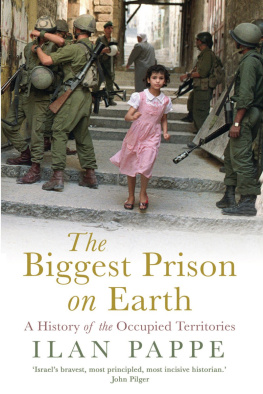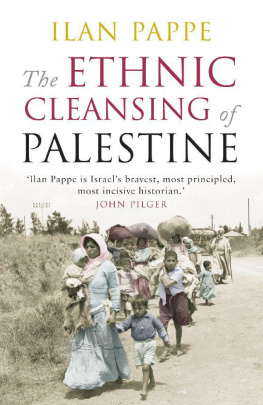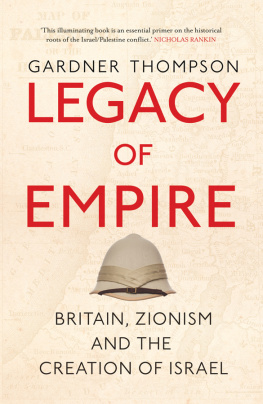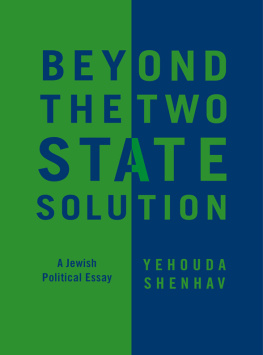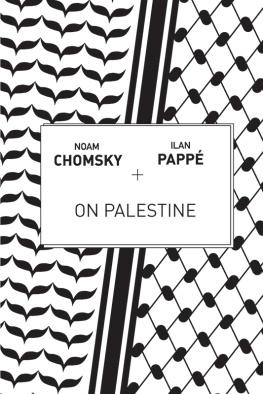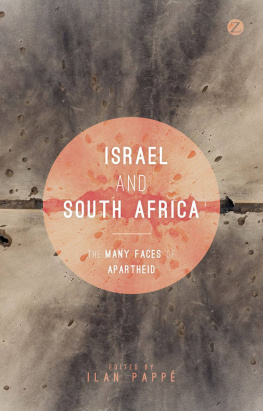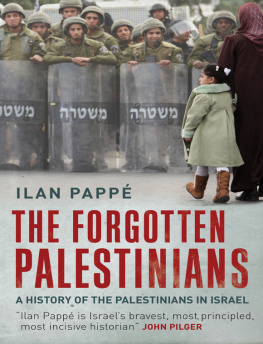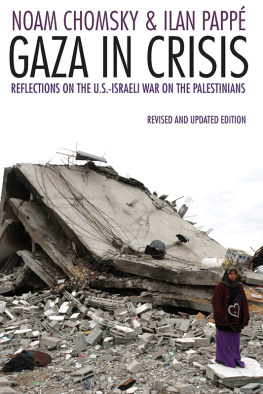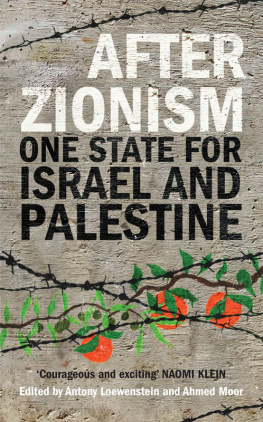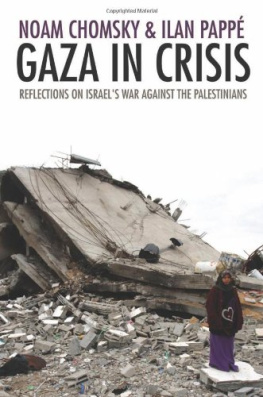TEN MYTHS ABOUT ISRAEL
Ilan Pappe

First published by Verso 2017
Ilan Pappe 2017
All rights reserved
The moral rights of the author have been asserted
1 3 5 7 9 10 8 6 4 2
Verso
UK: 6 Meard Street, London W1F 0EG
US: 20 Jay Street, Suite 1010, Brooklyn, NY 11201
versobooks.com
Verso is the imprint of New Left Books
ISBN-13: 978-1-78663-019-3
ISBN-13: 978-1-78663-021-6 (US EBK)
ISBN-13: 978-1-78663-020-9 (UK EBK)
British Library Cataloguing in Publication Data
A catalogue record for this book is available from the British Library
Library of Congress Cataloging-in-Publication Data
Names: Pappe, Ilan, author.
Title: Ten myths about Israel / Ilan Pappe.
Description: Brooklyn, NY : Verso Books,
[2017] | Includes bibliographical
references and index.
Identifiers: LCCN 2016044832 | ISBN 9781786630193
Subjects: LCSH: PalestineHistory. |
Palestinian ArabsIsraelHistory. |
Arab-Israeli conflict. | IsraelPolitics and government.
Classification: LCC DS125 .P2985 2017 | DDC 956.94dc23
LC record available at https://lccn.loc.gov/2016044832
Typeset in Electra by Hewer Text UK Ltd, Edinburgh
Printed in the UK by CPI Mackays
Contents
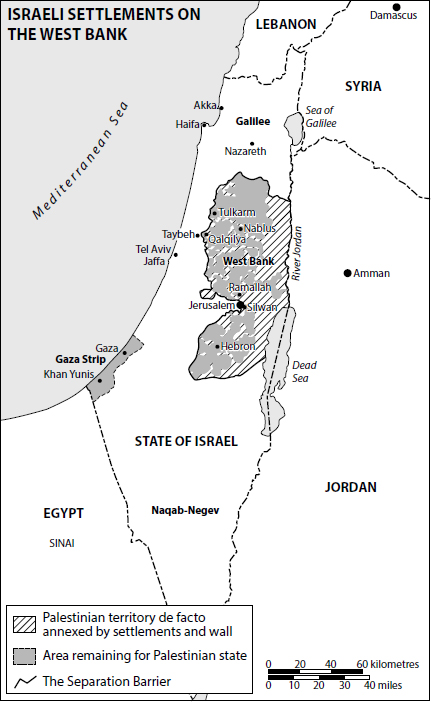
History lies at the core of every conflict. A true and unbiased understanding of the past offers the possibility of peace. The distortion or manipulation of history, in contrast, will only sow disaster. As the example of the IsraelPalestine conflict shows, historical disinformation, even of the most recent past, can do tremendous harm. This willful misunderstanding of history can promote oppression and protect a regime of colonization and occupation. It is not surprising, therefore, that policies of disinformation and distortion continue to the present and play an important part in perpetuating the conflict, leaving very little hope for the future.
Constructed fallacies about the past and the present in Israel and Palestine hinder us from understanding the origins of the conflict. Meanwhile, the constant manipulation of the relevant facts works against the interests of all those victimized by the ongoing bloodshed and violence. What is to be done?
The Zionist historical account of how the disputed land became the state of Israel is based on a cluster of myths that subtly cast doubt on the Palestinians moral right to the land. Often, the Western mainstream media and political elites accept this set of myths as a given truth, as well as the justification for Israeli actions across the last sixty or so years. More often than not, the tacit acceptance of these myths serves as an explanation for Western governments disinclination to interfere in any meaningful way in a conflict that has been going on since the nations foundation.
This book challenges these myths, which appear in the public domain as indisputable truths. These statements are, to my eyes, distortions and fabrications that canand mustbe refuted through a closer examination of the historical record. The common thread that runs through this book is the juxtaposition of popular assumption and historical reality. By placing each myth side by side with the truth, each chapter exposes the weaknesses of the received wisdom through an examination of the latest historical research.
The book covers ten foundational myths, or clusters of myths, which are common and recognizable to anyone engaged in one way or another with the IsraelPalestine question. The myths and the counter arguments follow a chronological order.
The first chapter charts Palestine on the eve of the arrival of Zionism in the late nineteenth century. The myth is the depiction of Palestine as an empty, arid, almost desert-like land that was cultivated by the arriving Zionists. The counter- argument reveals a thriving pre-existing society undergoing accelerated processes of modernization and nationalization.
The myth of Palestine being a land without people has its correlate in the famous myth of the people without a land, the subject of connection between the Jewish communities in the world and Palestine was religious and spiritual, not political. Associating the return of the Jews with statehood, before the emergence of Zionism, was a Christian project until the sixteenth century, and thereafter a specifically Protestant one (in particular an Anglican one).
closely examines the myth that equates Zionism with Judaism (so that anti-Zionism can only be depicted as anti-Semitism). I try to refute this equation through an historical assessment of Jewish attitudes to Zionism and an analysis of the Zionist manipulation of Judaism for colonial and, later, strategic reasons.
The fourth chapter engages with the claim that there is no connection between colonialism and Zionism. The myth is that Zionism is a liberal national liberation movement while the counterargument frames it as a colonialist, indeed a settler colonial, project similar to those seen in South Africa, the Americas, and Australia. The significance of this refutation is that it reflects how we think about the Palestinian resistance to Zionism and later to Israel. If Israel is just a democracy defending itself, then Palestinian bodies such as the PLO are purely terrorist outfits. However, if their struggle is against a colonialist project then they are an anticolonialist movement, and their international image will be very different from the one Israel and its supporters try to impose on world public opinion.
revisits the well-known mythologies of 1948, and in particular aims to remind readers why the claim of voluntary Palestinian flight has been successfully debunked by professional historiography. Other myths associated with the 1948 events are also discussed in this chapter.
The final historical chapter questions whether the 1967 war was forced on Israel and was therefore a no choice war. I claim that this was part of Israels desire to complete the takeover of Palestine that had almost been completed in the 1948 war. The planning for the occupation of the West Bank and the Gaza Strip began in 1948, and did not cease until the historical opportunity offered by a reckless Egyptian decision in June 1967. I further argue that the Israeli policies immediately after the occupation prove that Israel anticipated the war rather than accidently staggered into it.
The seventh chapter brings us into the present. Is Israel a democratic state, I ask, or is it a non-democratic entity? I make the case for the latter by examining the status of the Palestinians inside Israel and in the occupied territories (who together make up almost half of the population ruled by Israel).
deals with the Oslo process. After nearly a quarter of a century since the signing of the accord, we have a good perspective on the fallacies connected to the process and can ask whether it was a peace accord that failed, or a successful Israeli ploy to deepen the occupation.
A similar perspective can be now applied to the Gaza Strip and the still widely accepted myth that the misery of the people there is due to the terrorist nature of the Hamas. In the ninth chapter I choose to differ, and present another interpretation of what has happened in Gaza since the turn of the last century.
Finally, in the tenth chapter I challenge the myth that the two-states solution is the only way forward. We have been blessed with excellent activist and scholarly works critiquing this formula and offering alternative solutions. They constitute a formidable challenge to this last myth.


